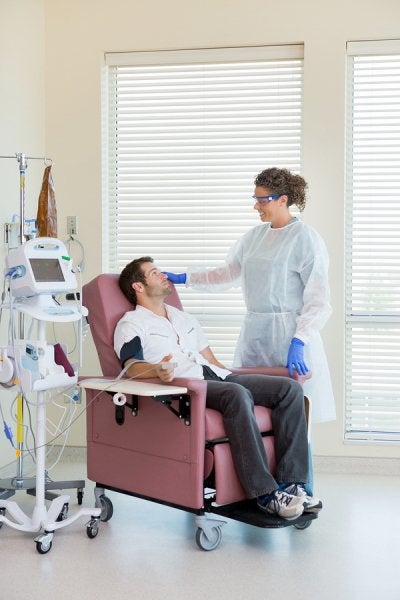-
Prostate Cancer: Prevention and Risk Factors
Prostate cancer affects more men in the United States than any other type of cancer, with hundreds of thousands of new diagnoses every year. It’s important to understand, however, that prostate cancer is a curable illness—in fact, the majority of men who contract it go on to survive it. As with every type of cancer, knowing the illness is essential to beating it. Here is what you need to know about prostate cancer.
What is prostate cancer?
The prostate is a gland between the penis and the bladder that is primarily responsible for the production of sperm. While prostate cancer does not always present symptoms, people who have it may experience erectile dysfunction, difficulty urinating, or blood in the urine. If the cancer is detected while it is still confined to the prostate, it is considered curable. What are the risk factors for prostate cancer?
What are the risk factors for prostate cancer?
Your risk of the disease increases with age; the majority of men who develop prostate cancer are older than 65. Prostate cancer rates are highest among African-American men. You are also considered to be at a higher risk of developing prostate cancer if you have a closely related family member who has had it. By age 50, almost half of all men experience small changes in the size and shape of cells in the prostate. Therefore, routine screening after the age of 50 has empowered the diagnosis and early treatment of prostate cancer.How can you prevent prostate cancer?
While prostate cancer can’t absolutely be prevented, there are a number of steps you can take to reduce your chances of developing the disease. If you are considered at high risk for prostate cancer, you may want to talk to your physician about getting screened for the condition, which is a simple blood test at an earlier age than the routine screening. Staying active and eating a healthy diet that includes vegetables can help.If you are concerned about a misdiagnosis or possible medical error, contact the law firm of
Pegalis & Erickson, LLC, in New York. We advocate for people of all ages in order to help our clients financially and make healthcare safer for everyone. You can reach us today by calling (516) 684-2900.
-
The Challenges in Diagnosing Cancer
Diagnosing cancer in its earliest stages can make an enormous difference in how successful treatment is. By the same token, failing to diagnose cancer on a timely basis can reduce the effectiveness of treatment. Even if medical practitioners are careful and conscientious, however, it can still be difficult to diagnose many forms of cancer. These are some of the types of cancer that present the greatest challenges:
Pancreatic Cancer
While it is considered relatively rare, pancreatic cancer also has one of the lowest survival rates of any type of cancer. The symptoms are subtle and can easily be mistaken for the signs of a different condition. There is also no widely agreed-upon method for effectively detecting this cancer at its earliest stages.Liver Cancer
Like pancreatic cancer, liver cancer does not usually show any obvious symptoms in its early stages. Since the liver is located deep inside the body, the tumors are impossible to detect through self-examination. By the time it can be more easily diagnosed, the disease has usually spread to the point where it is much more challenging to treat. Brain Cancer
Brain Cancer
Brain cancer is one of the most difficult forms of cancer to identify. There is no way to screen for a brain tumor, and the symptoms—which include headaches and muscle weakness—are readily confused with those of other illnesses. Unfortunately, brain cancer is not usually diagnosed until its later stages.Ovarian Cancer
Cancer of the ovaries is the deadliest type of reproductive cancer. As with other hard-to-detect cancers, ovarian cancer does not present any obvious symptoms at first. It is also difficult to detect during pelvic exams, and it is not usually found during Pap tests. There is no reliable screening for ovarian cancer, so it’s important to see a physician if you notice any of the warning signs—which include bloating, feeling unusually full after eating, and more frequent urination. Women who are positive for the BRCA gene are at a greater risk for developing Breast Cancer but also Ovarian Cancer. You should discuss your particular situation with your physician to establish a plan for surveillance and care options.If you believe that you or a loved one has suffered serious consequences because a medical professional failed to identify the symptoms of cancer, it’s time to talk to Pegalis & Erickson, LLC. Our legal team has nearly 50 years of experience bringing successful medical malpractice suits on behalf of our clients. For a free consultation at our law office in Long Island, New York, call (516) 684-2900.
-
Prostate Cancer Awareness
 This September, you might notice blue ribbons around your town. These signify National Prostate Cancer Awareness Month, which is the second-most common cancer in American men, after skin cancer. Since prostate cancer often doesn’t cause symptoms until the disease is already advanced, it’s necessary for doctors to recommend screening tests as appropriate. Not all doctors stay on top of recommendations for screenings, which, in some cases, may form the basis for a medical malpractice lawsuit. However, you can protect your health by being proactive and asking your doctor about getting screened.
This September, you might notice blue ribbons around your town. These signify National Prostate Cancer Awareness Month, which is the second-most common cancer in American men, after skin cancer. Since prostate cancer often doesn’t cause symptoms until the disease is already advanced, it’s necessary for doctors to recommend screening tests as appropriate. Not all doctors stay on top of recommendations for screenings, which, in some cases, may form the basis for a medical malpractice lawsuit. However, you can protect your health by being proactive and asking your doctor about getting screened. There are two main screening tests. The first is the prostate specific antigen (PSA) test, which is a simple blood test. The second is a digital rectal exam (DRE), which involves feeling the prostate gland to check for abnormalities and assess its size. Confirming a diagnosis of prostate cancer requires more tests, including imaging scans and a biopsy.
Pegalis & Erickson, LLC welcome requests for case reviews regarding medical malpractice on Long Island, New York. Call (516) 684-2900 if you think you or a loved one may have suffered ill effects from a delayed diagnosis of prostate cancer.
-
Prostate Cancer Awareness
 Prostate cancer is among the most common types of cancer in the U.S. As with other types of cancer, early detection is preferable. By detecting prostate cancer early and understanding their options, men can make proactive decisions for their wellness. Unfortunately, some patients must cope with the consequences of delayed diagnosis or misdiagnosis, which are types of medical malpractice. By becoming better informed about prostate health, men may reduce the chances that they will suffer from the results of medical malpractice.
Prostate cancer is among the most common types of cancer in the U.S. As with other types of cancer, early detection is preferable. By detecting prostate cancer early and understanding their options, men can make proactive decisions for their wellness. Unfortunately, some patients must cope with the consequences of delayed diagnosis or misdiagnosis, which are types of medical malpractice. By becoming better informed about prostate health, men may reduce the chances that they will suffer from the results of medical malpractice. For example, it’s a good idea for men to ask their doctors about their risk factors of prostate cancer and to ask whether they should be screened, rather than to wait for the doctor to suggest it. Some risk factors include being 40 years old or older, being African-American, and having a family history of prostate cancer.
Have you or a loved one received a delayed diagnosis as a result of medical negligence in Long Island, New York? You can call Pegalis & Erickson, LLC, a malpractice law firm, at (516) 684-2900 to discuss your case with our personal injury lawyers.
Recent Posts
Popular Posts
categories
- Uncategorized
- Infographic
- Patient Safety
- Patient Health
- Stillbirth
- Birth Injuries
- Medical Malpractice
- Medical Negligence
- Event
- Erb's Palsy
- Injury
- ER
- Video
- Cancer Misdiagnosis
- Medication Errors
- Cerebral Palsy
- Medical Negligence Lawyer
- Anesthesia Injuries
- Brachial Plexus
- Prostate Cancer
- About Us
- Men's Health
- Skin Cancer
- Breast Cancer
- Misdiagnosis
